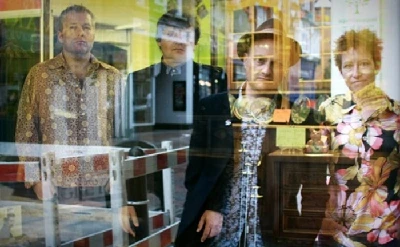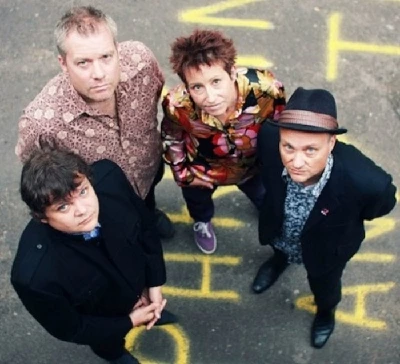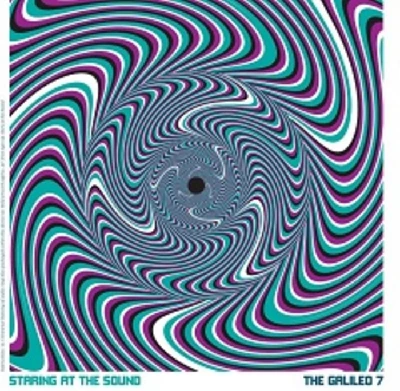published: 23 /
2 /
2013

Galileo 7 is the new band of former Prisoners and Solarflares bassist, Allan Crockford. John Clarkson chats to him about his decision to take up songwriting in it for the first time, and the group's recently released second album, 'Staring at the Sound'
Article
“I don’t want to pretend that it is a dynamic high tech stage show,” says Allan Crockford when asked to describe one of his band the Galileo 7’s live sets. “It is forty-five minutes of high-energy psych-tinged pop, or however you might want to describe it. We just get up and play our songs. It is unpretentious, hopefully.”
‘Unpretentious’ is a word that could also be used to describe Allan Crockford. On the phone to Pennyblackmusic, he is clearly enthusiastic about and proud of his latest project, but bluntly honest and matter-of-fact, and refreshingly free of flamboyant posturing or waffling when it comes to talking about his band.
Crockford has spent the last thirty years in and out of groups, and, with his first and most famous band the Prisoners, was part of the flourishing Medway scene of the early 80s that saw a score of usually short-lived groups – including the Pop Rivets, the Tallboys, the Stingrays and the Milkshakes – hit the mid and lower regions of the indie charts.
The Prisoners, for whom Crockford played bass, unusually made a lead instrument out of the Hammond organ, and combined this with punk-influenced guitar riffs. They recorded four albums in quick succession, ‘A Taste of Pink!’ (1982), ‘Wisermiserdemalza’ (1983), ‘The Last Fourfathers’ (1985) and ‘In from the Cold’ (1986), the latter of which was released on Stiff Records subsidiary Countdown.
The Prisoners met with only minimal success in their original lifetime, and broke up in late 1986 amidst record company meddling and rows over songwriting credits. They have since then, however, gone on to be seen as a major influence on bands such as the Charlatans and the Inspiral Carpets.
After briefly reforming the Prisoners in the mid-1990s, Crockford again playing bass and main songwriter and front man Graham Day went on to form the similar-sounding Solarflares, who also recorded four albums before falling into permanent hiatus in 2004.
Allan Crockford has also played either guitar or bass in Thee Headcoats, JTQ, Phaze and the Stabilisers. The Galileo 7, which he formed in 2009, is, however, a departure for him, being the first group that he has fronted and also been the songwriter for.
While pushing an organ again to the fore, this time played by his wife Viv Bonsels, the Galileo 7 rely slightly less on the jagged riffs off many of his other bands and put an increased emphasis on melody. Merging together elements of psychedelia and power pop as well as to a lesser extent Crockford’s trademark garage/punk sound, there is also a stronger focus on harmonies. The group have drawn comparisons with the Who, the Kinks and early Syd Barrett-era Pink Floyd, and have released two albums to date. ‘Are We Having Fun Yet?’ (Teensound Records, 2010) and ‘Staring at the Sound’ (State Records, 2010).
Pennyblackmusic spoke to Allan Crockford about the Galileo 7 and ‘Staring at the Sound’.
PB: You were not the main songwriter in the Prisoners and the Solarflares, but formed the Galileo 7 after finding a late talent for writing your own songs.
AC: That is true. I wasn’t the songwriter in the Prisoners or any of the other bands that I was in. I used to contribute to arrangements and little bits and pieces as we went along, but all of my other bands had a main songwriter. I was always the bass player or the guitarist.
The Galileo 7 is the first band that I have written all the songs for. I started writing in the Stabilisers which was the band I was in before this one. It was quite late to start writing, and so I thought that it was time to have my own band before I was too old (Laughs).
PB: Who were the Stabilisers?
AC: I was in them for six years. We were a punk/power pop act. We did three albums and we were signed to the Springsteen guitarist Little Steven’s label, Wicked Cool. I was one of the guitarists.
PB: This is the first time you have been the front man as well. Was it difficult moving from being the bassist and the guitarist to that?
AC: It has been very challenging. I always found bass playing and doing backing vocals very easy and enjoyable. It was the same with the guitar. You have to concentrate a lot more when you’re singing, and it does for me take some of the enjoyment off it, doing that and also holding everything together by providing the songs.
When you have been playing music for a long time, however, I think that you have to challenge yourself a little bit. Otherwise it becomes just a hobby. I have got a job, but playing music is still my main passion. Writing all the songs has provided a new challenge for me, especially as I started so late with it. I never felt the need to do it until very recently.
PB: What was it made you start songwriting initially?
AC: I got hold of some digital multi-tracking recording software. It didn’t involve working with synthesisers. You just record with it in the normal way, but onto your computer. I was mucking about with that and jamming with myself, and I realised that I was coming up with things that sounded like songs, so I decided to take it one stage further and to try and write some lyrics and to sing them.
I also had an outlet for them straightaway with the Stabilisers. The songs that I had written didn’t actually suit that band, but eventually when my time in the Stabilisers finished I thought, “I have got a backlog of songs. Let’s do it properly.”
PB: How long after you left the Stabliisers did it take you to form the Galileo 7?
AC: About a minute (Laughs). My wife Viv plays the organ in the Galileo 7. She was originally a bass player, but she said she would like to have a go at learning the organ in the band, and so that was the two of us straightaway. Then Russ Baxter, a mate of ours, became the drummer. He plays with us in a few local bands and is also currently the drummer in Secret Affair. He was also in Phaze, another of my bands, with Fay Hallam and I between 2001 and 2003. We made two albums together.
Our original bassist Paul Moss played with us for about three years, but he got too busy with his other bands. We now have a new bass player called Mole. He is slightly younger than the rest of us, and is in a band called the Higher State. It is their label, State Records, that ‘Staring at the Sound’ came out on. We have known him for a while, and he is a really good bass player and also helped to engineer ‘Staring at the Sound’. When Paul didn’t have any time to do anything with us anymore, Mole was the obvious person to step in as he had done some of the backing vocals on ‘Staring at the Sound’ as well. He joined in May of last year.
PB: With Secret Affair being fairly prolific and having released a comeback album in the last year, and Mole also being involved with the Higher State, is it difficult to find the time to rehearse and to record together?
AC: You have just to be organised and to take what opportunities you can when they come up. Everyone has got a job as well. There are families and bands, and you just have to work it in. I am sure that there are loads of musicians that deal with the same problems. The main thing that you have to watch is not letting it get you down when you can’t do anything for weeks. You have to plan ahead as much as you can for when everyone is available.
PB: The Galileo 7 obviously has got an element of the classic Medway sound, but at another level it extends far beyond that. As you describe on your website, it takes away that “trademark crashbangwhallop” and then you mix it up with a lot of genres. Did you set out with the manifesto of doing something different than you had done in the past or was that something which just evolved?
AC: No, it is not done consciously. The music that I have always enjoyed listening to has always been on the more melodic end of that era. I like the garage punk stuff. I like it just as much, but I have played that stuff for years, and it seems that the stuff is coming out now in my own song writing is based more around melodies and harmonies and chord structures rather than riffs and energy. A lot of those bands and artists that I like are those whom we seem to get compared to. I am quite happy to go along with that, and not be a typical Medway band if there is such a thing.
PB: The Prisoners and the Solarflares famously wrote and recorded their material quickly. Have you adopted a similar songwriting approach to the Galileo 7?
AC: Not necessarily. The first and third Prisoners albums were recorded quickly on a low budget and were good. The second and fourth albums cost more, took longer and we didn’t like them. Generally it seems to me that the more time you spend on something the worse it is in the end (Laughs) because you end up taking away whatever was good about it in the first place and just refining it away. It is for me about getting a balance between capturing something that was good at the start, but at the same time not doing so to the detriment of everything else.
We also can’t afford to spend loads of money in the studios, and the advent of home recording also makes things cheaper. At one end you could spend as much time as you like at home, but at the other you have got to be aware the same rules reply. You have got to capture something initially, so we generally do our backing tracks at least live as much as possible.
PB: Where did you get the name of the band from? Is it true that it comes from a ‘Star Trek’ episode?
AC: Yes, it is. It is Episode 16 of the very first series, which I think was made in 1966. It just sounded going back for years and years like a band name. I started putting some of my demos on MySpace, and I thought that rather than put my name on it I would call it something else and that is the first thing that I thought of.
PB: There was also a Prisoners track, ‘Revenge of the Cybermen’? Are you into science fiction in a big way?
AC: I am not into that genre any more than any other really. I used to be a lot more, but it is not something that I am into really these days. A lot of the time you choose titles because they sound good, especially instrumentals like ‘Revenge of the Cybermen’. I won’t be writing any songs about alien invasions or anything like that (Laughs).
PB: Viv plays a tiny organ apparently, doesn’t she?
AC: It is a Teisco organ that was made in about 1968 or 1969. It is not quite a toy, but it is on the very small side. I picked up on eBay it for about £80. I have always been into Vintage Combo organs, and the Teisco is about the size of a largish suitcase.
It sounds exactly like what it is and goes out of tune occasionally, but when you are playing gigs you don’t want to be carting around a huge stack of gear, even if it does sound great. There is nothing better than the sound of a Hammond organ, but at the same time there is nothing heavier either (Laughs).
PB: You have recently released ‘Staring at the Sound’ on CD and vinyl, but have been encouraging fans to buy the vinyl version whenever possible. Do you see yourself as essentially a vinyl band?
AC: No, not necessarily. We decided to do that because State Records’ focus is on vinyl. The CD pressing we did ourselves. The vinyl pressing was paid for as a 50/50 split between ourselves and State Records. They are evangelical about vinyl to the extent that they are not interested in putting out downloads or CDs, only vinyl, and their attitude is that if people buy it, that is fine, and if they don’t then that is tough.
I know that digital is the way most people listen to music these days, even though that is inferior as far as I am concerned. You can’t, however, listen to vinyl in the car, and so I am not dogmatic about it either way. I prefer to listen to things on vinyl whenever possible, but in the end I am most concerned about quality in music and songs.
PB: What other plans have you got for the future?
AC: We are going to start to record some new material soon. We will be recording songs over the next few months. I would like the songs to sound even more eclectic than they did on ‘Staring at the Sound’ and each one to sound different from another. That is all airy fairy stuff really. In the end you come out with what you come out with.
PB: Thank you.
The Galileo 7 will be headlining the PennyBlackMusic Bands’ Night, which will also feature Dave Harding (Richmond Fontaine), T.O.Y.S. and Ten, on the 16th March at the Brixton JAMM at 261 Brixton Road, South London, SW9. 6LH.
More information about the Galileo 7 can be found at www.thegalileo7.fourfour.com. (which is the best and cheapest source for all the Galileo 7 material) and www.facebook.com/thegalileoseven.
Video footage and the Galileo 7's contribution to the current Couch by Couch West video festival in the US can be found at http://youtu.be/EGw9Bh2eADE.
Band Links:-
https://www.facebook.com/thegalileosev
Have a Listen:-
Picture Gallery:-

